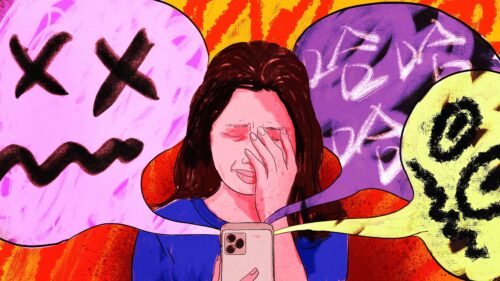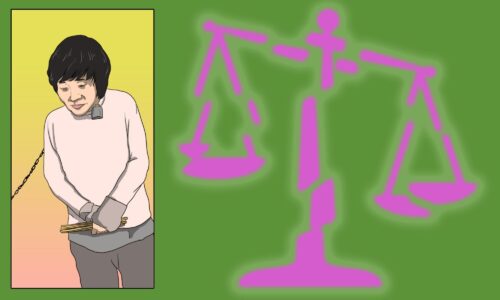China sentences six to imprisonment over plight of chained woman of Xuzhou
Although Chinese officials may have hoped that the verdict would bring conversations about the case to a neat close, the lenient sentences were met with an overwhelmingly negative response from the public.

A court in China has jailed six people for terms of up to 11 years over their roles in the human trafficking and abuse of a mother found locked up in a freezing shed in Xuzhou, bringing a conclusion to a high-profile case that has sparked widespread anger, endangered public trust in the government, and prompted a soul-searching national conversation about human trafficking and gender equality in China.
According to a statement released last Friday by the Xuzhou Intermediate People’s Court in Jiangsu Province, Dǒng Zhìmín 董志民, the 56-year-old man who had kept the woman since 1998, was sentenced to nine years in jail after being found guilty on charges of abuse and unlawful detention. Five other people who sold the woman to Dong also received prison terms — ranging from eight to 13 years — for abduction and human trafficking.
The court described Dong’s crimes as “heinous” and said his “abusive practices had caused permanent damage to the mental health of the victim,” who has been referred as “little plum blossom” (Xiǎohuāméi 小花梅) in news articles and court records. However, Dong was not charged with purchasing a trafficked woman because the 20-year statute of limitations had lapsed. Dong also fathered eight children with the woman, but despite her apparent confinement and inability to grant consent, rape was not among the charges.
The plight of Xiaohuamei came to public attention in January 2022 when a Chinese content creator focusing on exposing poverty in rural China found her being held captive in a dirt-floor hut outside her family home in Feng county, in the city of Xuzhou. The grim footage showed the middle-aged woman standing in the doorless brick shack with her neck shackled in iron chains tied to a wall. Looking dazed and confused, the woman mumbled incoherently and shivered in the freezing weather. Next to the shed was a warm house where her husband Dong and their eight children resided.
As the video went viral on the Chinese internet, prompting angry calls for investigation, local authorities initially denied speculation that Xiaohuamei was a victim of human trafficking, insisting that she married Dong by her own will in 1998. However, in the following weeks, contradictory information provided by the local government, coupled with strengthened censorship of discussions about it on the Chinese internet, made many people increasingly skeptical about the truth behind the woman’s predicament. Under public pressure, in February 2022, the central government eventually formed a special investigative team to look into the case and arrests were subsequently made.
Many details of the case were revealed for the first time at last week’s trial. Citing results of the final investigation, the court discloses in its verdict that Xiaohuamei is believed to have been abducted and sold on multiple occasions before ending up with Dong and his father, who paid 5,000 yuan ($726) for her in 1998. When Xiaohuamei arrived at Dong’s home, the court said, she was “basically able to take care of herself and communicate with others.”
But as she gave birth to eight of Dong’s children between 1999 and 2020, her mental health deteriorated and she was diagnosed with schizophrenia. After a one-time doctor’s visit in 2013, Dong never sought treatment for Xiaohuaming afterwards and has kept her chained in a room since 2017. “During this period of time, Xiaohuamei’s daily needs were not provided for. She was routinely hungry and cold. There was no water, electricity or sunshine in her place. Her living conditions were deplorable,” the court noted.
On the same day the verdict was delivered, Xinhua reported that over the past year, Xiaohuamei had been undergoing psychological counseling and drug therapy under the supervision of a team of psychiatric experts across the country. According to Xinhua, Xiaohuamei’s condition is stable at the moment and she can hold simple conversations with medical staff.
Anger at lenient sentences
Over the weekend, the news of the sentences touched off a whirlwind of strong reactions in China. On Weibo, a slew of hashtags related to the case dominated its list of trending topics, with the most popular one attracting over 100 millions within the first hour of the ruling.
Although Chinese officials may have hoped that the verdict would bring conversations about the case to a neat, satisfying close, the announcement was met with an overwhelmingly negative response from the public, with many internet users criticizing the sentences as too lenient, especially the one for Dong. “Nine years are shorter than the time during which Xiaohuamei was forced to conceive babies for Dong. How is it fair” a Weibo user raged.
The sentiment was echoed by Lǚ Pín 吕频, a prominent Chinese feminist activist currently based in the U.S. “I’m definitely not satisfied with the result, but that’s to be expected considering how the case has been handled from the jump,” she told The China Project. “Throughout the entire scandal, the government has consistently suppressed public opinion and refused to be held accountable. When the outcome of a case depends solely on the arbitrary judgment of those in power, it is bound to disappoint people.”
Jeremy Daum, a senior fellow of the Yale Law School’s Paul Tsai China Center, told The China Project that although he was “originally surprised” that there wasn’t an additional charge of “buying” a trafficked woman for Dong, the prosecutors had given “fairly heavy sentences in recognition of the awful circumstances, and also undoubtedly aware of the public attention.”
It’s “worth noting that the Supreme People’s Procuratorate of China allowed the prosecution of the other traffickers — except two of them — as necessary, despite the statute of limitations having passed, a procedure allowed only for the most serious offenses punishable by a maximum of life imprisonment or death,” he added.
Online, questions have also been raised about whether Dong should be charged for sexually assaulting Xiaohuamei as she lacked the legal capacity to consent with mental impairments. For people disheartened by the outcome, analyzing the case from a legal perspective is a “focused and relatively acceptable” way to criticize the sentences under censorship, according to Lü.
“I understand the sentiment behind this argument but it’s debatable if there’s a real marriage in this,” she said. “The problem in general is that many people still think domestic violence is condonable, even in extreme cases like this. For them, the concept of family is built on the recognition of patriarchal values and the denial of women’s rights. For example, in this case, Xiaohuamei was considered to be a commodity owned by Dong’s family after he made the purchase.”
Martial rape is not a crime in China
Under China’s current legislation, marital rape is neither a criminal nor civil offense. Although China passed an anti-domestic violence law in 2015, there’s no mention of non-consensual sexual relations between spouses in the legislation, which makes it part of a small group of countries that have not criminalized rape in marriage.
“The language of China’s rape law doesn’t actually preclude marital rape, although there is no separate offense of marital rape. The surrounding debate essentially amounts to whether the marriage itself is a form of consent to sexual relations (or even a duty to continue sexual relations), Daum said, adding that while such cases are rarely treated as a crime because of “courts and prosecutors’ efforts to preserve ‘marital harmony,’” there have been instances where husbands were convicted for “violently raping their wives” as they began seeking a divorce.
“In this case, there could conceivably be questions of whether the mother was able to consent to marriage at all as her condition may have left her without civil capacity, though those with limited civil capacity are often still able to marry,” Daum explained. “The 2015 domestic violence law, by its text, covers all physical and prolonged psychological abuse, and should also offer some protection, but the reality is that authorities are still reluctant to get involved in what is viewed as a ‘marital issue’ matter, especially where it might lead to the end of the marriage.”
Human trafficking and mental health
In addition to better protection of women within marriage, observers also called for the government to step up its efforts to address other issues highlighted by Xiaohuamei’s case. One of them is human trafficking, a persistent problem caused in large part by China’s decades-long one-child policy, which led families to abort female fetuses and resulted in a shortage of women. Unable to find brides, many rural bachelors like Dong would turn to human traffickers.
In light of Xiaohuamei’s case, the Ministry of Public Security launched a campaign last year to combat trafficking in women and children. But as some observers pointed out, because the rationale behind the initiative was chiefly driven by political stability instead of protection for women and children, it’s unlikely to bear fruit in the long term.
Compared to human trafficking, another aspect of the case that has been frustratingly overlooked in people’s discussions is “the mental health situation in China,” said Daum. Like Xiaohuamei, many of the mentally ill in China are locked away — some shackled in cages — by their relatives who see them as frightening or burdensome to deal with. A 2013 new article published by the Beijing News revealed that there were about 100,000 such people in Hebei Province. Nationwide, China had about 16 million people with severe mental illnesses, of which 10% had the potential for violent tendencies, and a large proportion of these became “caged people,” according to the article.
“The persistent problems have been a lack of awareness of available treatment, stigma, and more practically, a lack of resources for care. The number of qualified psychiatrists remains too low to address the country’s needs,” Daum said. “The mental health law enacted in 2015 made efforts to promote awareness and reduce the financial burden of treatment, but progress is slow for these individuals who are too easily ignored. Because the law focused heavily on preventing wrongful commitment, it also initially left some doctors unclear on consent requirements, and afraid to take more proactive treatment measures.”






